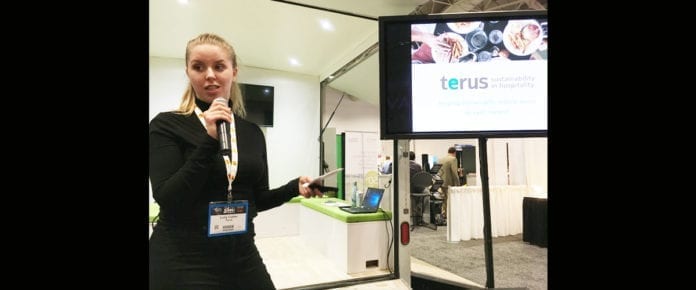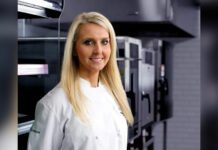
TORONTO — Ideas surrounding food waste and recovery were discussed during the RC Show 2019, held earlier this week.
During her “Reducing Waste in Foodservice” workshop, held at the show’s Eco Stage, Lucy Cullen, co-founder of Terus — a Toronto-based social enterprise committed to reducing waste in restaurants — discussed a partnership with Leaders in Environmentally Accountable Foodservice (LEAF), which is launching in the fall, and gave operators advice on how to reduce waste and costs in their operations.
“The program will look at waste, energy, water and staff training so that companies can go above and beyond their sustainability goals,” Cullen explained. “Whether it’s aerosol cans, cleaning products or hollow-wick candles, we’ve seen food waste and the disposal of hazardous-waste products as a way to help restaurant be more sustainable. Our goal is to reduce the costs of waste management and lessen the environmental impact.”
Cullen also took part in the “Sustainability in Your Operations: How Less Can be More” panel discussion at the show’s Speaker Stage, where she was joined by Stephen Dixon, founder of Know Energy; Rebecca Mackenzie, president and CEO of the Culinary Tourism Alliance; and Zak Weston, corporate engagement specialist, Good Food Institute. The discussion was moderated by Bruce McAdams, assistant professor, School of Hospitality, Food and Tourism Management, University of Guelph.
The experts provided attendees with strategies to minimize waste and conserve energy, as well as tips to capitalize on the local and fast-growing plant-based-food movement. At Terus, the social enterprise has saved operators more than $52,000 from waste reduction and saved more than 104,300 lbs. of waste from landfills.
While progress is being made, the experts noted that more needs to be done to educate operators about waste reduction and food recovery. “Take advantage of free programs offered by the government,” Dixon said. “Find gas and electric programs that don’t cost you anything. A lot of this comes down to being committed and doing the research; partnering with local and national programs that can help you save costs.”
Food Recovery
Jean-Francois Archambault, CEO and founder of La Tablée des Chefs and Chris Zielinski, executive chef at Maple Leaf Sports Entertainment (MLSE), spoke about their food-recovery initiative during a panel discussion on the RC Show’s Culinary Stage on Monday.
Last fall, the pair launched a food-recovery program that has helped rescue more than 250 tons of edible excess food, which has led to more than 600,000 meals for people annually. Archambault and Zielinski, who have partnered with Second Harvest, MLSE and the Bell Centre in Montreal, encouraged operators to work with local and national programs to recover as much food as possible. Not only will it benefit a business’ reputation, but Archambault added that it will lead to reduced waste-management costs.
“If you don’t do food recovery in 2019, with the environmental and green movement, that’s where you’ll hit your reputation,” he warned. “Hundreds of establishments are doing it and there’s no reason why you shouldn’t be doing it. If you introduce the process, it’s bringing more food to banks and shelters and it’s a process that’ll ultimately benefit your business.”

















